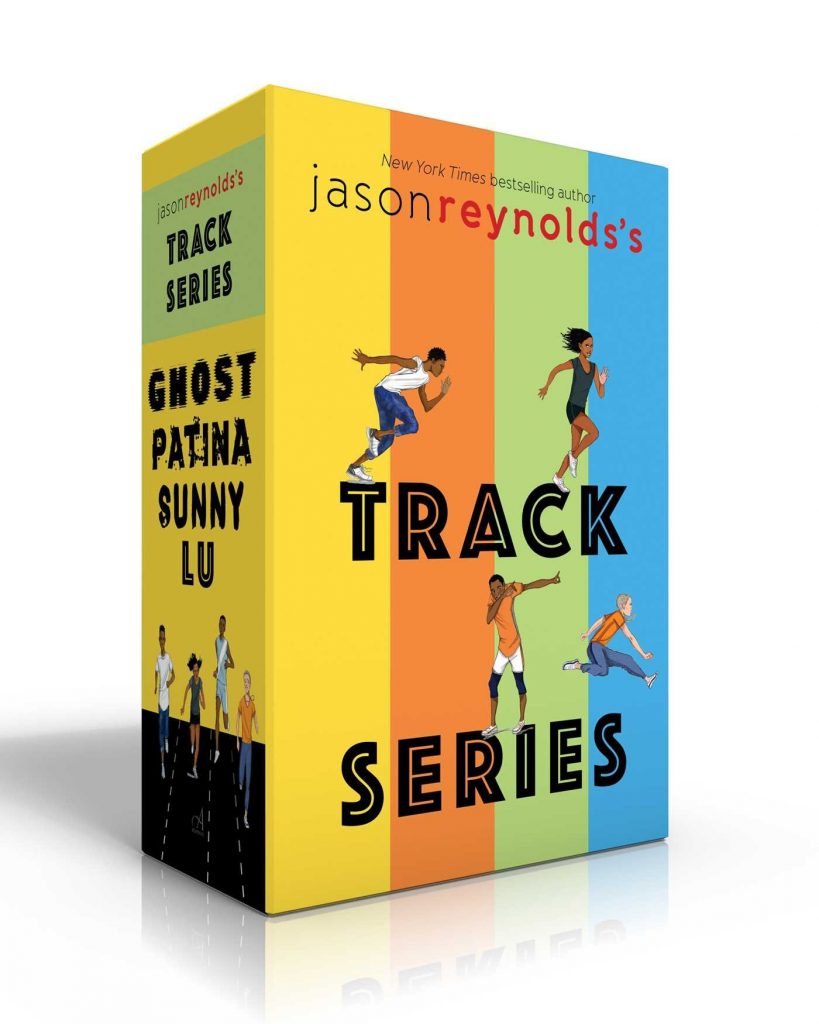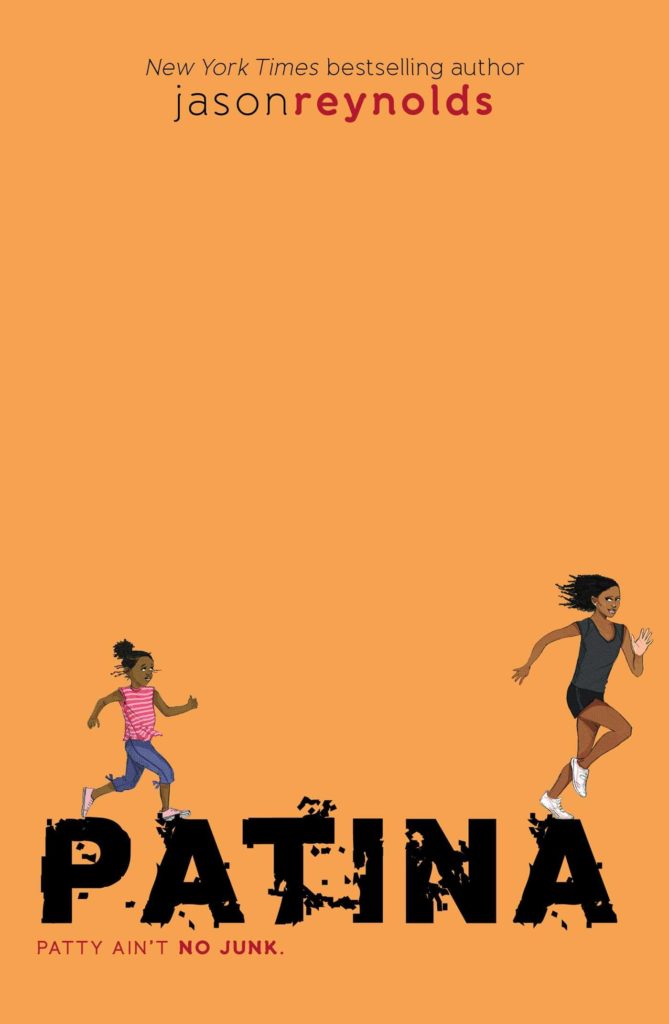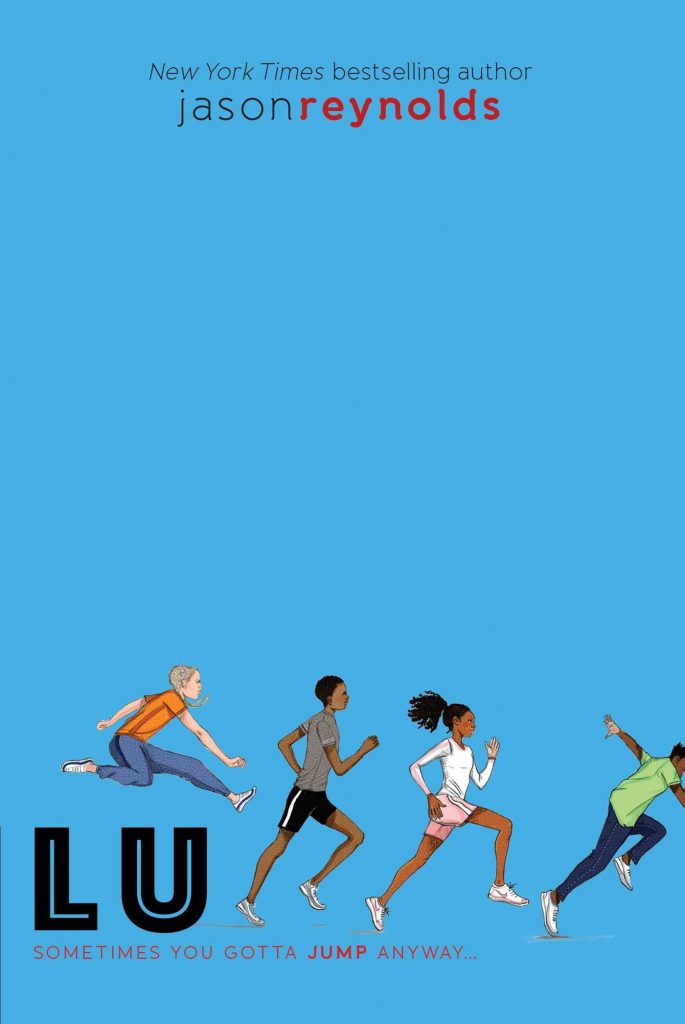Jason Reynolds is an author we’ve kept an eye on ever since his debut in 2015 with When I Was the Greatest. That novel, and All American Boys (which he co-wrote with Brendan Kelly) were firmly in the YA category with mature themes and some harsh language. But Jason Reynolds’s “Track” series, based on his own experiences as a middle-grader track team member, is not just suitable for middle grades—it’s excellent.

Each volume of the quartet, starting with Ghost, tells the story of a different member of the team. This year he brought the series to a close with Sunny (April) and Lu (Oct). Janie and Betsy discuss what makes this series a standout.
Janie: There’s a lot I appreciate about Jason Reynolds; chiefly that he has a feeling for his audience. When writing for middle graders, he can address serious problems without being heavy or grim. And even though all his characters (in the Track series, and elsewhere) are African American, race does not define them. They live in a distinct culture, but have the same problems growing up and making right choices as any other kids. He also acknowledges church and faith as part of his characters’ lives. Betsy, what do you think makes this series stand out?
Betsy: Janie, this is one of my favorite contemporary series for middle grades for several reasons. First, I, too, was a middle grades (and high school) track team member. Reynolds nails it on the track team aspect. It’s refreshing to read a sports series that’s not about the usuals (basketball, football, and baseball). Since track is a more individual sport, the characters remain distinct individuals working on particular events within the sport. Track is an outlet for the characters (and a second family), but they are all individuals with unique voices and struggles.
We’ve talked behind the scenes about the different “voices” of the 4 main characters. Janie, do you think Reynolds is successful at this? How does he help the reader slip into each different character’s experience?
Janie: I’ll say up front that I haven’t read all four: I never got around to Patina (who is the only girl on the team). Of the boys, Ghost—whose real name is Castle—is the most straightforward. He probably has the most traumatic background, too, so he doesn’t feel the need to pussyfoot around.
Sunny’s voice is the most distinct because his thoughts lean toward stream-of-consciousness and there’s a hint that he may have some disorder like synesthesia. He tries to reproduce the sounds in his diary—skwilup bleep blurb squish—and it’s a bit of an obstacle for readers. But worth sticking with him, in my opinion.
Lu is the flashy one, with earrings and gold chains. His voice is more rhythmic and rhyme-y, with a touch of jive.
All four of these books are short, so the author doesn’t have much time to leisurely set the table. Right away you hear the character speaking and learn something about his/her life. First-person narratives are overdone in children’s books, but the pacing and immediate action, besides the distinctiveness of each voice, makes you forget any irritation you may have about first person and get right into the story.
Each character has a particular issue they’re struggling with. Betsy, could you tell us about Ghost and Patina?

Betsy: Ghost is wrestling with anger, primarily at his father, but also at the hand he’s been dealt. Being poor, having a dad in jail, wanting to fit in, not wanting (initially) to work for it, Ghost manages to show us our own hearts. We’re all frustrated at times with our circumstances, and we want an easy way out to fame and glory. Coach steps in, offers some tough love, and helps Ghost (and the reader) realize that “being all you can be” is never a one-man show or an easy road.

Patina is the sort of prickly, self-sufficient little girl you just want to hug by the book’s end: she’s mothering her little sister, grieving her father’s death, making sure her mother (a diabetic amputee) is cared for, doing more than her fair share for the group project at school, and trying not be a burden onher aunt and uncle who’ve taken her in. Track is her outlet, but she’s on a new relay team and having to learn to really work with other people. By the end of the book, Patina’s realized she needs other people and real community to stand on her own two feet, but she “ain’t no junk.” There’s a lot going on in this book, but I liked it even better on a re-read. And, despite the fact that Reynolds has never been a middle school girl, he nails Patina’s “voice.”
What about Sunny and Lu? And how does Reynolds manage to wrap up this series when each book ends on a bit of a cliff hanger?

Janie: Sunny probably comes from the most “elite” family—his father is a doctor and so was his mom, but she died of a rare toxemia while giving birth to him. The other significant adult in his life is his tutor (he’s homeschooled), who encourages him to write down his scattered thoughts. That’s why his voice is so quirky. The action centers around the day Sunny stopped running—just stopped, in the middle of a meet. While getting to bottom of something he himself doesn’t understand, we learn he has father issues—the two can’t communicate, or not in any way that the boy finds natural to communicate. Finding yourself in relation to other people is a problem we all face—heightened in Sunny’s case, but I think that makes his story more compelling.

Lu brings up the rear. He’s the only one with an intact family: his mother and father not only married and stayed together, but early in the story they announce they’re going to have another baby! Lu can’t adjust to the idea he’s gong to have a sibling. He’s always been told he’s special; something he accentuates with the bling, but also something he’s born with. Lu is albino, the only “white” player on the team, in a literal sense. It’s made him overcompensate by stylized behavior and star turns on the track team. But the prospect of becoming a big brother—not welcome at first—gradually draws him out into the wider world, to start being a brother to friends around him who made need a little extra encouragement.
The main thread drawing these stories together is the team’s coach. As it happens, Coach Brown has links to every runner on the team, though only the end of the series will reveal what they all are. He’s had similar issues to all of them, and yet has overcome and has reached out to help them. At the end, he needs help, and they all come through. The conclusion is kind of a Hollywood-style, music-rising, confetti-throwing celebration. I thought it was a littleover the top, but hey, why not? What’s you take on the finale, Betsy?
Betsy: I really liked the finale, though it is definitely bordering on “cheesy.” The first three books in the series each end with the main character about to start a race/event at a track meet. The reader has no idea whether or not the character wins or loses—and that’s precisely the point. The character’s performance on the track is about perseverance, teamwork, self-identity… not about whether he or she wins or loses. But with Lu, Reynolds has an entire series to wrap up. The reader needs more of a conclusion than leaving Lu in the starting blocks for his hurdles race. But how to get the entire team out of their championship meet? I think having them rally to support their Coach was a good ending, even though it’s almost too feel-good.
All in all, this is a series we both like a lot. Readers will enjoy some books in the series more than others, depending on which character’s voice draws them in (and, perhaps, which character’s family background resonates with them). A sports series that’s not the usual basketball/football/baseball, that features both male and female protagonists, that celebrates families and community (especially father-figures), that handles big issues (theft, anger, violence, drugs, racism, poverty, bullies, grief and more!) concisely and in a middle grades-friendly way: the Track series is a winner.
For more information, check out our full length reviews of Ghost, Patina, and Sunny. For other sports books, check out our Sports Books That Pack a Punch book list!
Support our writers and help keep Redeemed Reader ad-free by joining the Redeemed Reader Fellowship.
Stay Up to Date!
Get the information you need to make wise choices about books for your children and teens.
Our weekly newsletter includes our latest reviews, related links from around the web, a featured book list, book trivia, and more. We never sell your information. You may unsubscribe at any time.
We'd love to hear from you!
Our comments are now limited to our members (both Silver and Golden Key). Members, you just need to log in with your normal log-in credentials!
Not a member yet? You can join the Silver Key ($2.99/month) for a free 2-week trial. Cancel at any time. Find out more about membership here.

